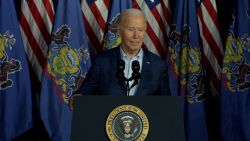As Democrats try to square growing calls for impeachment proceedings against President Donald Trump with hesitation from party leadership – and the political reality of a Republican-controlled Senate – it’s worth understanding what’s behind the concept of impeachment and why it should or shouldn’t apply to Trump.
Luckily, Frank Bowman III, a law professor at the University of Missouri, is out with the definitive history of impeachment in his new book, “High Crimes and Misdemeanors; A History of Impeachment for the Age Of Trump.”
We asked him in the lightly edited conversation below what something meant to curb the power of kings of England has to do with the current President of the United States.
Where does impeachment come from?
CNN: I found it really interesting the way you tied the idea of impeachment back to the Magna Carta and how lords used it almost as a form of protection against the king. Is there anything left from that original meaning in the way it is applied today?
BOWMAN: For centuries, the kings and queens of England were the dictators of their age, with the added advantage that they could claim a divine right to rule. They sought close-to-absolute power when they could. The other power centers in the society – hereditary aristocrats (lords), landowners, clergy, merchants, lawyers, judges and others – clustered in Parliament and fought for the idea that the king ruled under the law with an obligation to serve the whole kingdom, not merely his personal interests.
Parliament couldn’t use impeachment to depose the king himself, but they did use it to bring down ministers of the king who promoted absolute royal power and denied the authority of Parliament and the laws. They charged such ministers with subverting the “ancient and well established form of government” of the kingdom and introducing tyranny.
Under our Constitution, impeachment extends all the way to the person who heads the executive branch, the president. And the basic theory of the most important old English impeachments is built into our Constitution. We can impeach a president when his conduct subverts our form of government – the rules and norms that make up our constitutional order – and threatens tyrannical government by the chief executive without regard to the legislature or the law. I’d argue that’s exactly the situation we now face.
Is there a precedent for impeaching Trump?
CNN: You profile, in great detail, the impeachments of Andrew Johnson and Bill Clinton and the near-impeachment of Richard Nixon. Which of those bears the most resemblance to the possible effort by Democrats against Trump?
BOWMAN: Nixon is the closest in terms of the offenses he committed. Nixon’s troubles began with illegal efforts to gather information against his Democratic opposition in the 1972 election, but mushroomed when he tried through lies, dangling pardons, bribery, attempting to enlist the CIA and FBI in a cover-up, firing special prosecutor Archibald Cox, suborning perjury, specious claims of executive privilege, etc., to obstruct the investigation. He put the cherry on top by defying legitimate subpoenas from the House Judiciary Committee. The parallels to Trump’s conduct in relation to the Russia investigation and other inquiries are not exact on every point, but they are very close.
A possible, and frightening, difference between Nixon and Trump is that Nixon, in the end, was a man of the law in the sense that, while he committed offenses and tried to evade responsibility for them, he nonetheless believed in the constitutional structure of the US and that its laws applied to him. So when push came to shove and he was ordered to produce incriminating material, he did. I am quite sure that Trump neither understands nor believes in the American constitutional system. And I am not sure that Trump believes that he is bound by the law.
Johnson’s case is quite different than Trump’s on its facts and historical context. It was a fundamental dispute between Johnson and the majority in Congress over the proper approach to post-Civil War Reconstruction and the role of black freedmen in American life. Johnson was ready to reempower the unapologetic leadership class of the defeated South and consign black people to the status of permanent peons. The Republicans in Congress wanted a wholesale restructuring of Southern society, including rights for freed black people. The impeachment fight was between two fairly well-articulated and clashing theories about what America should become.
One can try to superimpose some coherent idea of America on Trump’s flailings, but in the end, the problem with Trump is not that he is trying to move the country toward some unpleasant, but coherent, vision of the future but that he is destroying the constitutional order to gratify his own ego and pursue personal wealth and power. In that respect, the fight between congressional Democrats and Trump is similar to some clashes between Parliament and the English crown.
Still, Johnson’s impeachment may have at least one lesson for us: The House impeached Johnson, but he escaped conviction and removal by one vote in the Senate. As a result, the effort to impeach him is often called a failure and a misuse of the impeachment power. I disagree. Johnson should have been impeached and convicted because his vision of America’s future was fundamentally wrong AND he would not accept the contrary judgment of Congress. Though he was not removed, the impeachment did cripple him politically and force him to back off some of his most intransigent positions on Reconstruction. The lesson, to which I’ll return below, is that impeachment without removal can sometimes be valuable.
What’s are the limits of high crimes and misdemeanors?
CNN: You detail many possible high crimes and misdemeanors, including obstruction of justice, abuse of the pardon power, lying and greed. Can Democrats essentially say anything they don’t like is a high crime and/or misdemeanor?
Bowman: Yes … and no. From a purely procedural point of view, Gerald Ford was right when he famously said (during the course of an unsuccessful attempt to impeach Justice William O. Douglas) that an impeachable offense is whatever a majority of the House and 2/3 of the Senate say it is. That’s because (despite what Mr. Trump seems to think) congressional decisions on what does or does not constitute impeachable conduct are not “justiciable” – that is, they are not reviewable by the courts. (I know Alan Dershowitz has said the contrary, or something like it, but he’s dead wrong and, as usual, just trying desperately to keep his name in the media.)
That said, there are some generally accepted historical parameters for what does and doesn’t qualify as impeachable. Classically, they must be “great” offenses, that is, they need not be crimes, but must be serious offenses against the law or constitutional order. Generally, they involve misuses of the president’s office, though most experts concede that really serious private misconduct would count. For example, Mr. Trump’s famous boast notwithstanding, a president who committed a private murder is surely impeachable. President Clinton avoided conviction in the Senate for a variety of reasons, but among them was surely the conclusion by many senators that his misconduct, though disgraceful and criminal, was private, pretty inconsequential and unrelated to his presidential role.
I could go on, but the basic point is that a set of generally shared understandings about the kinds of conduct that should be impeachable has tended to place outside limits on what Congress is willing to seriously consider when contemplating impeachment. We’re talking about historical norms, not enforceable law. Of course, as we are reminded daily in the current administration, norms are flimsy things once those in power decide to ignore them.
Is impeachment possible with a Republican Senate?
CNN: Some Democrats want to impeach Trump but it seems extremely unlikely they could remove him from office with a Republican-led Senate. Does that essentially move impeachment off the table?
BOWMAN: I don’t think so. I respect Speaker Nancy Pelosi’s apparent view that impeachment would be politically disadvantageous for Democrats. However, Trump’s assault on American constitutional structures and values is so profound and so dangerous that I think it requires a response. If that response cannot remove him from office, it can at the least explain to the American people the facts about his conduct and, or even more importantly, why what he is doing is so wrong, so contrary to our constitutional history and so dangerous for our future. A properly conducted impeachment inquiry is the tool the Constitution gives Congress to perform this task.
Impeachment is a power granted the House by the express language of the Constitution. Therefore, in an impeachment inquiry, Congress’ power to demand information from the president is at its highest – far greater than the more general oversight powers of Congress to inquire into executive branch operations for other legislative purposes. Moreover, an impeachment inquiry – and the hearings that would be part of it – could command public attention more than anything else Congress might do. Let’s be honest. It may be that nothing can cut through the endless stream of broadcast and social media chatter and focus the country on what Trump has done and why it is constitutionally unacceptable. But the best shot at that is probably impeachment.
Moreover, the lesson of history is that impeachments can succeed in the political sense even when they do not remove the offending official. British history is full of examples of officials who were impeached by the House of Commons and not convicted by the House of Lords but who were nonetheless politically destroyed.
Likewise, just before the American Revolution, the Massachusetts Colonial Legislature impeached Chief Judge Peter Oliver for the sin of accepting a salary from the crown. Oliver was not convicted, because the royal governor dissolved the Legislature before he could be tried in the upper chamber (previewing, perhaps, the approach of Sen. Mitch McConnell). But he was forced from office nonetheless by public outcry, and the principle that American judges should be accountable to American legislatures, not the faraway royal government, was established in patriot minds.
I gave the example of President Andrew Johnson above. He was not removed, but he was politically crippled and his approach to Reconstruction wounded, if (sadly) not killed.
What should Democrats do?
CNN: As the person who has spent more time studying impeachment than maybe anyone else in the country, what would be your advice to Democrats considering doing it now?
BOWMAN: I won’t presume to tell Congress what it should do. I’ll just say to the Democrats that if you are going to do it, don’t do it as a noble, but futile, gesture. If you’re going to do it, (a) use its power as a means to extract information about presidential misconduct that you can’t otherwise get, and (b) structure it to educate persuadable, but underinformed, citizens about Trump’s conduct and why it endangers the health of the American republic.
What should everyone remember about impeachment?
CNN: What’s the one thing you think every American should keep in the back of their head about impeachment?
BOWMAN: Impeachment is the Constitution’s defense against a president who, by conscious design or because of defects in his character, threatens republican government. The framers made impeachment hard because they didn’t want Congress throwing out presidents in partisan hissy fits. Still, the framers meant it to be used if, somehow, a manifestly unfit person were to become president and endanger the constitutional order they so carefully constructed. Donald Trump is the contingency for which they gave us the weapon of impeachment. The question is whether our politics is so broken that we lack the will even to pick it up.
















